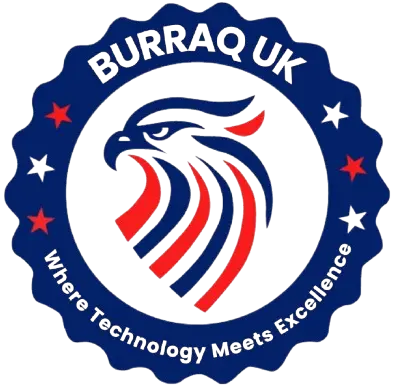Technical & Risk-Based Training
In high-risk industrial environments, especially in sectors such as textiles, engineering, and manufacturing, traditional safety practices are no longer enough. Modern industries require a technical and risk-based approach to safety—one that focuses on identifying hazards proactively, analyzing operational risks, and implementing systematic controls that prevent accidents before they happen.BURAAQ UK is proud to introduce a comprehensive Technical & Risk-Based Safety Training Program aimed at empowering its workforce with the skills and knowledge to manage operational risks effectively, enhance compliance with safety standards, and foster a zero-incident safety culture.

Aim of Technical & Risk-Based Training
To enhance the technical competence and risk awareness of BURAAQ UK’s workforce by providing structured training on hazard identification, risk assessment, and control measures—ensuring safer operations, regulatory compliance, and a proactive safety culture across all departments.
Course Overview
Technical & Risk-Based Training
Educational Qualification:
- Minimum: Matric/GCSE or equivalent
- Preferred: Diploma, Technical Certification, or Graduate Degree in:
- Engineering (Mechanical, Electrical, Chemical, Textile)
- Industrial Safety / Environmental Science
- Occupational Health & Safety
- Or related technical fields
Professional Experience:
- Minimum 1 year of working experience in an industrial, production, or technical role (preferred but not mandatory)
- Fresh graduates with relevant academic background may also apply
Language Proficiency:
- Basic understanding of English (reading/writing) is preferred
- Training may be supported with Urdu/local language explanations as needed
Target Audience Includes:
- Safety Officers / EHS Staff
- Engineers / Technicians
- Factory Supervisors / Line Managers
- Maintenance & Utility Staff
- Quality & Compliance Officers
- Final-year students in technical fields
| Course Code | Curriculum Title | Credit | DLH |
|---|---|---|---|
| BUK1743-1 | Fundamentals of Safety & Risk Management | 2 | 10 |
| BUK1743-2 | Hazard Identification & Risk Assessment (HIRAC) | 2 | 10 |
| BUK1743-3 | Technical Risk Control & Emergency Preparedness | 2 | 10 |
| BUK1743-4 | Safety Audits, Incident Investigation | 2 | 10 |
| BUK1743-5 | Process Safety Management (PSM) | 2 | 10 |
| BUK1743-6 | Electrical & Mechanical Safety | 2 | 10 |
Module 1: Fundamentals of Safety & Risk Management
- Introduction to Occupational Health & Safety (OHS)
- Legal & regulatory framework (UK HSE, ISO 45001)
- Accident causation theories (Heinrich’s Triangle, Domino Theory)
- Introduction to risk-based thinking in operations
- Key safety terms: hazard, risk, incident, control, mitigation
Module 2: Hazard Identification & Risk Assessment (HIRAC)
- Types of hazards (mechanical, electrical, chemical, ergonomic, fire, environmental)
- Hazard Identification Techniques: Checklists, Job Safety Analysis (JSA), HAZOP
- Risk assessment matrix: Likelihood × Severity
- Control measures hierarchy (Elimination to PPE)
- Practical exercise: Conducting a HIRAC for a specific task
Module 3: Technical Risk Control & Emergency Preparedness
- Engineering vs. administrative controls
- Machinery & equipment safety (LOTO, guarding, inspections)
- Fire safety in industrial settings (detection, suppression, evacuation)
- Emergency response planning and drills
- Personal Protective Equipment (PPE) – selection, use, maintenance
Module 4: Safety Audits, Incident Investigation & Continuous Improvement
- Conducting internal safety audits
- Reporting unsafe conditions and near misses
- Root Cause Analysis (RCA) and Incident Investigation
- Corrective & Preventive Actions (CAPA)
- Introduction to Behavior-Based Safety (BBS) & PDCA cycle
Module 5: Process Safety Management (PSM)
- Introduction to PSM (as per OSHA & UK standards)
- Key elements: process hazard analysis (PHA), operating procedures, mechanical integrity
- Safety Instrumented Systems (SIS) & alarms
- Managing change (MOC – Management of Change)
- Case studies: Bhopal, Texas City refinery blast
Module 6: Electrical & Mechanical Safety
- Electrical hazard types: shock, arc flash, short circuits
- Safe use of electrical tools and panels
- Lockout/Tagout (LOTO) procedures
- Mechanical hazard controls: machine guarding, isolation
- Preventive maintenance for safety
- Safety & EHS Officers
- Engineers & Technical Staff
- Maintenance & Utility Teams
- Supervisors & Line Managers
- Quality, HR & Compliance Officers
- Students & Fresh Graduates
- All Modules within this qualification are assessed internally by the approved training Centre and externally verified by BURRAQ UK. The program uses a criterion-referenced assessment approach to ensure that learners successfully meet all required learning outcomes.
- A Pass in any unit is granted only when the learner submits valid, reliable, and authentic evidence that demonstrates achievement of the assessment criteria. The Assessor is responsible for reviewing this evidence and confirming that the learner has attained the expected standard
